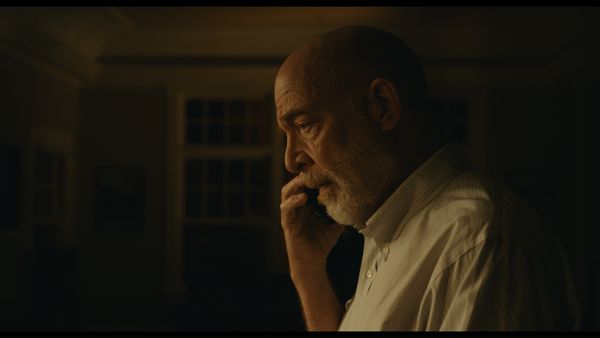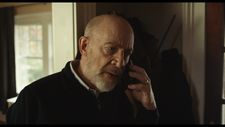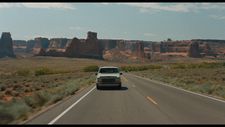 |
| JK Simmons in Little Brother |
Dealing with loved ones who are harming themselves is always a difficult thing, and perhaps even more so when it’s not a byproduct of something else but a simple desire not to be alive anymore, When we meet Pete (Philip Ettinger), he’s already been in that state for years. his little brother, Jake (Daniel Diemer), is picking him up from the hospital after his latest suicide attempt. Sheridan O’Donnell’s film, itself called Little Brother, follows their subsequent travels together under the influence of their controlling father, whom we gradually come to recognise as a far more complex character than he first appears.
This troubled man almost certainly contributed to Pete being the way he is, but he’s still desperate to save him – and also to protect Jake. It’s a difficult role to get right, and the film benefits considerably from the presence of Oscar winner JK Simmons, who spoke with me about what it meant to him.
 |
| JK Simmons in Little Brother |
“90 percent of the time, I just respond to what's on the page,” he says. “When Sheridan got this to me originally, the father was actually never seen on camera. He was just a disembodied voice on the phone, and even then I saw a maturity and a sensitivity from Sheridan, an understanding of parent child dynamics, that really hit me. And then, you know, as he went back over the script and decided that he wanted to see not only the father but the mother as well, and shoot some scenes, we were able to make that work logistically. And Dan Diemer was on the phone with me for all of those phone calls, which makes a huge difference in being able to play, especially, those kinds of emotional sorts of scenes. It just felt like it jumped off the page into my psyche.”
I tell him that I had wondered if he'd had the chance to meet the rest of the cast, given the way the film is shot.
“Yeah. Well, I didn't meet Dan in person until months later. We were both in LA and went out and got lunch, and I just wanted to thank him for actually being there for those phone calls because, again, that's often not the case. I didn't meet Phil until a screening in LA at the East Village, several months ago. I had seen the film in the meantime and obviously was happy and gratified with how well it came out and with the work that the two of them, with Sheridan, have done in creating this really believable and profound and funny at times, and just real, relationship.”
The father doesn’t have a lot of screen time but has a huge presence in the background of the film, shaping the young men’s past. I ask if he prepares differently for that sort of role.
 |
| Daniel Diemer and Philip Ettinger in Little Brother |
“No, I mean, you know, a day on set, a scene is just a scene. It gets a little more complicated if it's one scene out of 40 that you're in in the movie, and a dynamic that is constantly shifting between characters. But even in this small arc that the dad character has in this film, it does go somewhere. We do see him go somewhere. We see this stoic, stern, seemingly angry, unforgiving, unkind, almost unloving man finally break down and confess to his son that he just, you know, he's supposed to be able to fix it and he can't. And that's a devastating reality for anyone who is a parent, and certainly we've all felt that – hopefully in less dramatic and less life affecting ways, but, you know, there are times in life when we all feel ill equipped for the task at hand and when that involves trying to be there for our loved ones, it's devastating.”
That’s an interesting scene because it speaks to the different ways of expressing masculinity within the film and also, to an extent, to the type of roles that JK tends to be cast in more widely - often quite authoritative characters who maybe don't feel they have room to speak like that.
“I think a lot of that goes to my tendency to play authoritative characters,” he says. “First of all, by the time I started doing films, you know, I had been doing theatre for 20 years and I was a 40-year-old bald white guy with a low voice. I'm often going to be cast as the boss or the stern father or the head of the Aryan Brotherhood or whatever it might be. And, you know, certainly I try to take opportunities to step as far away from that as I can at times, too. But there's also such a wealth and diversity of those kinds of characters that I've been blessed to have people bring my way from, you know, J Jonah Jameson to Terrence Fletcher. I just always approach every character as a unique human being that I'm entrusted with lifting off the page and bringing to the stage.”
 |
| Little Brother |
It's a small arc with this character, but there is another powerful scene where he's trying to persuade Jake to step away and protect himself. It made it seem to me that maybe he feels he's already lost one son and he's trying to protect the other one.
“Yeah, absolutely. And it's a horrifying and devastating place to find oneself. And unfortunately, again, you know, many of us have close experience with suicide, with attempted suicide, with friends and loved ones, with devastating mental health issues, substance abuse issues. I've been touched by that in my life. My wife has, our kids have, unfortunatel. It's incomprehensible. You can't wrap your brain around it and at a certain point I think you need to listen to that inner voice or to that experienced voice, those words of wisdom from a loved one or a psychiatrist or a counselor or whoever, that says ‘Look, you have to protect yourself. If you go in after that drowning man, he's just going to pull you under.’ My dad character has gotten to that point. He can't help his eldest son anymore and he wants to try to save his youngest.”
Little Brother is now in cinemas across the US.





















